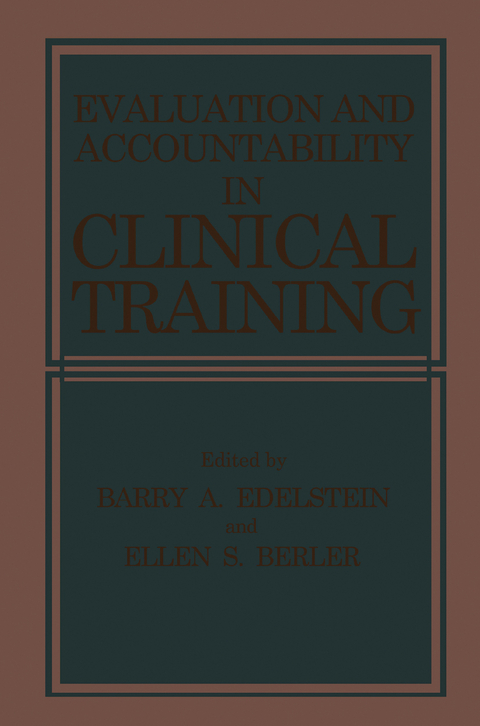
Evaluation and Accountability in Clinical Training
Kluwer Academic/Plenum Publishers (Verlag)
978-0-306-42510-3 (ISBN)
- Titel z.Zt. nicht lieferbar
- Versandkostenfrei innerhalb Deutschlands
- Auch auf Rechnung
- Verfügbarkeit in der Filiale vor Ort prüfen
- Artikel merken
Accountability in clinical training implies a strong relationship between the training outcomes touted by a training program and the performance of its graduates. The training program and its faculty must be able to ensure that students have the competencies necessary for entering the profession and can offer competent services. In addition, responsibility for the quality and value of training must be assumed by the profession. Pressure for accountability is becoming increasingly apparent as the public learns about fraud, waste, and abuse in publicly funded pro grams (Fishman & Neigher, 1982). Federally supported clinical training programs have had to defend their training practices against threats of funding loss without the hard data needed to support their practices. Funding seems to have been forthcoming mostly because of our ability to demonstrate the need for clinical, counseling, and school psychol ogists. Graduates seeking professional careers in such applied fields demand considerable trust from their clientele and the public-at-large when they establish themselves, offer and advertise their services, make claims on public monies, and profess to do good and no harm. Neither their clien tele nor the public are in the position to evaluate the services of the profes sion or the claims made for these. (American Psychological Association lAPA], 1982, p.
1 Evaluation and Accountability in Training for Professional Psychology: An Overview.- Validating Individual Practitioners.- Evaluation of Education and Training.- Conclusions.- References.- 2 Program Evaluation: Defining and Evaluating Quality.- Nominal and Ordinal Aspects of Quality.- Functions of External Evaluation.- Evaluation of Output.- Evaluations of Process.- Metaevaluation.- Final Comments.- References.- 3 Work Samples and Simulations in Competency Evaluation.- Psychology’s Evaluation of Itself.- History and Rationale.- Definitions and Examples.- Advantages of Performance Tests.- Disadvantages of Performance Tests.- Work Samples versus Simulations.- Conclusions and Discussion.- References.- 4 Current Status of Training Evaluation in Clinical Psychology.- Defining Evaluation Questions.- National Findings on Training Evaluation Practices.- Specification and Measurement of Clinical Competence.- Assessing Training Processes.- Future Directions.- References.- 5 Training and Evaluation in Counseling Psychology.- The Importance of Evaluation.- Efforts to Evaluate Training in the Helping Professions.- A Survey of Current Evaluation Practices in Counseling Psychology.- Future Directions.- References.- 6 Graduate Education and Training in Health Psychology.- Predoctoral Education in Psychology: Generic or Specialized?.- Doctoral Education in Health Psychology.- Postdoctoral Training in Health Psychology.- Employment Opportunities for Health Psychologists.- Licensure of Health Psychologists.- References.- 7 Evaluating School Psychologists and School Psychological Services.- The Emergence of the Specialties of Clinical Psychology and School Psychology.- Models of School Psychology.- Models of School Psychology Services and Evaluation.- A Three-Dimensional Paradigm forEvaluation.- Developmental Strands for Evaluating Changes in School Psychologists over Time.- Designing Custom Evaluations.- Conclusion.- References.- 8 Clinical Evaluation of Medical Students in U.S. Medical Schools.- Structure of Clinical Education in U.S. Medical Schools.- Evaluation of Medical Students during Clinical Education.- Developing an Effective System of Evaluation.- References.- 9 Improving Evaluation in Counselor Training and Credentialing through Standardized Simulations.- Types of Standardized Simulations in Counseling.- Applications of Standardized Simulations.- Expanding Applications of Standardized Simulations.- Conclusion.- References.- 10 Accreditation: A Link between Training and Practice.- The Nature of Accreditation: Values, Objectives, and Methods.- Accreditation of Education and Training Programs in Professional Psychology.- Standards for Practice in Professional Psychology.- Accreditation of Psychological Service Delivery Settings.- Concluding Remarks.- References.- 11 Licensure and Certification of Psychologists.- Summary of Minimal Competence by State.- Relationships among the Criteria of Minimal Competence.- The National Licensure Examination.- Content Validation of the EPPP.- New and Other Examination Methods.- Implications for Graduate Faculty.- References.- 12 Certification of Psychologists by the American Board of Professional Psychology.- Requirements for Certification by ABPP.- Future Trends in Credentialing by ABPP.- Certification Procedures and Criteria Established by the ABPP: Implications for Training in Professional Psychology.- Credentialing: Turf Guarding or Opportunity for Cooperation?.- References.- 13 Criterion-Referenced, Competency-Based Training in Behavior Modification.- Overview.- Need for Competency-Based Training.-Identification of Competencies and Assessment Criteria.- Developing Tests for Target Competencies.- Evaluation of the Assessment and Training Procedures.- Discussion.- Summary.- References.- 14 Continuing Professional Education for Clinical Psychology: A Practice-Oriented Model.- Overview of the Continuing Professional Education Development Project.- The Practice Description for Clinical Psychology.- The Practice Audit for Clinical Psychology.- Results of the Practice Audit Session.- The Clinical Skills Workshop.- Practice-Oriented Continuing Professional Education.- References.
| Erscheint lt. Verlag | 30.6.1987 |
|---|---|
| Zusatzinfo | XXVI, 400 p. |
| Sprache | englisch |
| Themenwelt | Geisteswissenschaften ► Psychologie ► Klinische Psychologie |
| Geisteswissenschaften ► Psychologie ► Verhaltenstherapie | |
| Medizin / Pharmazie ► Medizinische Fachgebiete ► Psychiatrie / Psychotherapie | |
| Medizin / Pharmazie ► Studium | |
| ISBN-10 | 0-306-42510-6 / 0306425106 |
| ISBN-13 | 978-0-306-42510-3 / 9780306425103 |
| Zustand | Neuware |
| Haben Sie eine Frage zum Produkt? |
aus dem Bereich


